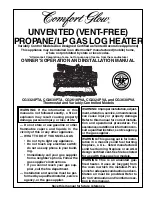
SAFETY INFORMATION
3
Please read and understand this entire manual before attempting to
assemble, operate or install the product.
1. The installation must conform with local codes or, in the absence of local codes, with the National Fuel Gas
Code, ANSI Z223.1 /NFPA 54, Natural Gas and Propane Installation Code, CSA B149.1, or Propane Storage
and Handling Code, B149.2.
2. Minimum clearance to the combustible materials is 3.61 ft(1100mm).
3. Perform a leak test with a soapy solution:
(a) To check gas connections.
(b) After connecting a new cylinder.
(c) Upon re-assembly after disassembly.
Please refer to the leak test procedure indicated in this instruction manual on page 11.
Replace the hose assembly prior to the appliance being put into operation if there is evidence of excessive
abrasion or wear, or if the hose is damaged. The pressure regulator and hose assembly supplied with the
appliance must be used. The replacement hose assembly/ regulator shall be that specified by the manufacturer.
4. If you don’t feel the heater is on a stable surface, use a ground screw to fix the base of the heater on the
surface where the heater is installed. Fix the base on an incline no wider than 15 degrees.
5. Place the propane hose with regulator assembly out of pathways where people may trip over it or in areas
where the hose will not be subjected to accidental damage.
6. Materials or items when stored under the heater will be subjected to intense heat and could be seriously
damaged.
7. Clothing or other flammable materials should not be hung on the heater, or placed on, under or near the
heater.
8. Children and adults should be alerted to the hazards of high surface temperatures and should stay away to
avoid burns or clothing ignition.
9. Young children should be carefully supervised when they are in the area of the heater.
10. Any guard or other protective device removed for servicing the heater must be replaced prior to operating
the heater.
11. Installation and repair should be done by qualified service person, the heater should be inspected before
use and at least annual by a qualified service person.
12. More frequent cleaning may be required as necessary. It is imperative that the control compartment, burners
and circulating air passageways of the heater to kept clean.
13. Keep the appliance area clear and free from combustible materials, gasoline and other flammable vapors
and liquids.
14. Do not obstruct the flow of combustion and ventilation air.


































